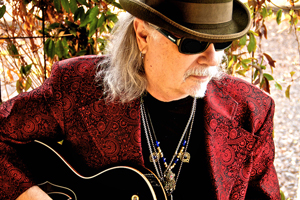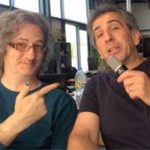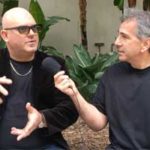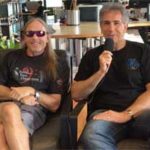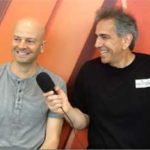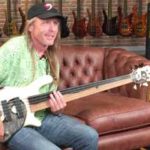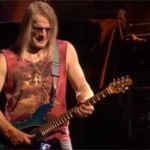Studio vet tells of playing world-renowned guitar riffs on classic Aerosmith, Peter Gabriel and Alice Cooper hits
By Jon Liebman
November 18, 2017
Photos by Mark Maryanovich
Born in Decatur, IL, in 1948, Steve Hunter, sometimes known as “The Deacon,” has recorded with some of rock’s biggest names, including Jack Bruce, Lou Reed, Dr. John, Mitch Ryder and Tracy Chapman. Though not a widely known fact, that’s Steve playing the opening solo on Aerosmith’s “Train Kept A Rollin’,” as well as the acoustic guitar intro to Peter Gabriel’s “Solsbury Hill.” He is prominently featured on no less than seven Alice Cooper albums, including Billion Dollar Babies and 2010’s Welcome 2 My Nightmare. Hunter has released several solo albums, including 2013’s star-studded Manhattan Blues Project. Legally blind due to an eye disorder called Pigmentary Glaucoma, Steve has found live work more challenging these days, though he continues to compose, do sessions and produce new music. His latest album, aptly titled Before The Lights Go Out, was released September 25th.
FGPO: Congratulations on your new release, Before The Lights Go Out. If I did the math right, this is your seventh album as a leader?
Hunter: I think so [laughs]. I forget sometimes. They’re so spread out, it’s hard to keep track of them sometimes.
FGPO: When you released Manhattan Blues Project, you had quite a lineup of featured guests, with everybody form Joe Satriani, Joe Perry, Johnny Depp, Marty Friedman, Tony Levin, 2Cellos… This new record seems scaled down a bit as far as outside star power.
Hunter: On this new record, I decided to take it easy with that because with Manhattan Blues I’d had so many different (players). I really enjoyed doing that. Tony Levin was the first guy I asked because I knew I was going to do a version of “Solsbury Hill” and he’s the perfect guy to ask to play bass on (because) he played bass on the original. And then I thought, what the hell, I might as well try somebody else. After I met Joe Satriani – we had a good time playing on stage together – I asked him if he would play on my album and he said absolutely. It snowballed from there. I just kept asking people and it was really cool that everybody was into doing it.
On the new album, I decided to put that to bed. I did that on Manhattan Blues and it was a blast and everybody I asked played great on it. It was really a wonderful experience for me. I really enjoyed it, but I thought maybe this time I would not have quite so many guests, just so I could kind of focus on different things that I wanted to try myself. Again, though, I asked Joe Satriani and he said absolutely. I don’t know what it is about him, but his playing and my playing seem to work really well together, even though we’re quite different.
So I got Joe, but then I thought I’d try something a little different this time. There was friend of mine named Erik Scott, who was a bass player for Alice Cooper back in the ‘80s, I think, or ‘90s. Alice Cooper came to play the House of Blues in LA and I was living there at the time and I met Erik after the show and we sort of hit it off as friends. So, this track comes along called “Mojo Man” and I thought Erik would play really great on it, so I asked him if he’d like to play and he said yeah. He played a great bass line. Joe Satriani also played one of the solos on that track.
So Erik was one of the guest bass players and the other one was a friend of mine named Andy Stoller, who I met with Tracy Chapman. I happened to run into him on Facebook. He was playing with Ann Wilson at the time. They were playing here in Phoenix and the drummer, Denny Fongheiser, also played with Tracy Chapman. So I went down to see them ‘cause these were good old pals of mine, road buddies, and Andy said the same thing, “Listen, if you’ve got anything you want me to play bass on, just let me know.” And along comes the song called, “Under The Bodhi Tree” and I thought, “I betcha Andy would play a great part on this because he plays both fretless and fretted. I had this idea of doing fretless throughout most of the song and then in the sort of rock interlude section to play fretted. There are not a lot of bass players that are really comfortable with both, and he happens to be very comfortable with both. He did this beautiful bass part. But that’s the end of my guests, other than my wife.
FGPO: Her vocal track on the last song, “Happy Trails,” is just beautiful.
Hunter: Karen was a singer in London for the longest time. She sang background with Gary Numan on a tour of England in the ‘80s and she also did a lot of jingles, a bunch of jazz singing, a whole bunch of different things in and around London. She’s got a whole lifetime of singing, so I like to use her voice when I can. I used it on Manhattan Blues too for background vocals. As a matter of fact, we’ve been kicking around the idea of maybe doing an EP of some American standards because she does like them and I like them. She’s a great singer. She’s got a beautiful voice.
FGPO: What were you trying to say with this new record? Was there a message you wanted to get across, or was it a compilation? Maybe some tunes that had built up?
Hunter: That’s a great way to put it because it was kind of all of the above, in a weird sort of way. Manhattan Blueswas a concept album, which is kind of an old concept [laughs]. Not too many people do that sort of thing any more, but I thought, well, I’m going to write an album about a city that I absolutely love, which is Manhattan. And I decided to write all the songs about Manhattan, about my favorite places in Manhattan. I love Gramercy Park. I love staying at the Hotel Chelsea and all that. So I just wrote what reminded me of those places. So it was a concept album.
On this album, I wanted to get away from the concept and I sort of wanted to experiment with different genres, putting them together in a hybrid sort of way. I don’t know if there was a real message except that I wanted this to rock a little more. I wanted to kind of bring back my old blues/rock roots from back in the ‘70s. Some of these songs were ten, fifteen years old that I never finished, like “Under The Bodhi Tree.” I think I wrote that twelve years ago, but I never finished it. I dug these things out and I thought, wait a minute; I like this. I’m going to develop this into something. “Mojo Man” I think I wrote about seven or eight years ago. So there were some brand new songs and then there were some older songs and older song ideas that I developed into full-blown songs on the album. I kind of wanted a compilation of different techniques and guitar sounds and things like that because that’s what I like. I like a multitude of guitar sounds. I don’t want just one guitar sound on the whole album. That bores me to death. The one thing I loved about Jimi Hendrix is that you knew it was him as soon as you heard it, but he always experimented with guitar sounds. He always tried little different things here and there. I’ve always admired that about him and I like that myself. I like to listen to a guitar album that has a multitude of sounds, different kinds of playing and all kinds of stuff. Those kinds of things interest me, so they end up in my albums, whether I want them to or not [laughs].
 FGPO: At the same time, it comes across as cohesive and not disjointed. I think you captured that very well.
FGPO: At the same time, it comes across as cohesive and not disjointed. I think you captured that very well.
Hunter: Thank you for saying that, because the weird thing is that when you’ve played as long as I have – I started playing when I was 8, so it’s like 60-some-odd years now that I’ve been playing guitar – and what happens is, even if you’re not thinking about it, even if you don’t consciously try to make yourself aware of it, you are developing a style. There’s a certain way your fingers hit the fretboard and it’s not like anyone else’s. So it almost doesn’t matter what kind of guitar you play. Whether it’s an acoustic, or a rock-sounding guitar, or a jazzy guitar, it doesn’t make any difference. That style that has just developed comes out. And so it helps with the cohesion.
And also, I’ve always been into melody. I’ve always loved melodic playing. I learned that from blues. B.B. King was the most melodic player I’ve ever heard. I learned a lot of my playing from listening to B.B. King records. So I’m drawn towards melody and I love when somebody like Miles Davis, when they’re improvising over jazz chords, he’s playing melodies. He’s not just riffing. And Cannonball Adderley. I’m thinking of Kind of Blue, that album. That’s the kind of playing I like, so I think that adds to the cohesion.
FGPO: You’ve played so many iconic guitar parts: “Solsbury Hill,” “Train Kept A-Rollin’,” “Billion Dollar Babies”… Why don’t more people know that?
Hunter: I wish I knew! [laughs] I’ve done my best over the last 40 years to let everybody know. Part of the reason, I think, is that in the ‘70s, there were a lot of situations where artists and groups weren’t really supposed to be using sidemen. The labels got really irritated when they’d signed a band and then found out the band didn’t play on half the record or other musicians came in and played their parts. A lot of labels got really angry about that. And of course it makes sense if they go out on the road and they can’t play the album, that’s not a very good thing. No one really wanted to give you credit because it sort of rubbed the label the wrong way. A lot of times I was hired to do things and sometimes I would be lucky if I got a special thanks. It was the same with Dick Wagner and others. I think Rick Derringer played on all kinds of stuff and nobody knew! [laughs]
I’ve done a lot of interviews. Each time a solo album’s come out, I’ve done interviews. I’ve also done interviews when something comes up like “Train Kept A-Rollin’.” That came up one time in Vintage Guitar magazine. Dick Wagner and I both explained the whole situation. I mean we took the whole situation and said, “THIS IS HOW IT HAPPENED.” And after that, we still got asked all the time. I wish I had a dollar for every time I’ve told that story.
FGPO: I give you a dollar, would you mind telling that story about the Aerosmith solo?
Hunter: No, I guess I’m gonna have to not mind. [laughs] I’ve told the story so much it’s almost to the point where I’m gonna forget stuff. I’m gonna start making stuff up.
FGPO: That’s even better!
Hunter: Yeah, I should do that! Well, it’s really simple. I was in New York at the Record Plant. At the time, the Record Plant in New York was like the studio. There were so many great records done there and the studio sounded so bloody good. I always loved going there to do work. They had one of the most killer amps ever, this old Tweed Twin. It sang like a bird. I loved that amp. I tried to buy it from them and they wouldn’t sell it. [laughs] Anyway, I’m there with Bob Ezrin. “Studio A” was a huge, huge studio. Across from the lobby, there was a little tiny studio. It was kind of like an overdub studio. Bob Ezrin was in “Studio A.” We were going to do some work, but he had to edit some two-inch tape. Now that’s very tedious, so, usually I would leave him alone because he had to keep track of where you’re cutting these pieces of tape and you lay them on the console and you have to put it all back together. So I usually get out of there and let him do his thing.
I was in the lobby, and I was having a cigarette. I used to smoke and I was having a cigarette and in “Studio C,” right across from me, the door opens up and Jack Douglas pokes his head out. Of course I knew Jack because at the time he was an engineer at the Record Plant and I had done a lot of work with him with Alice Cooper. He sticks his head out the door and he says, Hey, do you feel like playing? And I said, well yeah, I’d rather play than just sit here. He said let me go talk to Bob and make sure it’s okay. So he went into “Studio A” asked Bob if it was all right. And he got the Tweed Twin and I go into “Studio C.”
I didn’t even know the band, but there was the band, Aerosmith. They were all in the studio. I think somebody finally told me, this is Aerosmith. He introduced everybody, Steve Tyler, Joe Perry, everybody was there, Brad (Whitford). So we go in to the actual studio, the recording booth, and set up the mics and set up my headphones and all that stuff. We did one pass. And usually the first pass is the engineer’s time to get a good sound, get it balanced and all that. So I just kind of played through everything, you know. I was just playing to loosen up and warm up and Jack said, Wow, that’s really good, but you were stepping on the vocals. I didn’t have the vocals in my headphones. So he put the headphones in and I did another pass and he said great. And that was it. That was it. I was done. Unplugged, went back out to the lobby and I never thought about it again. When I finished the last part of my solo, towards the tail end of where I was playing, Dick Wagner would come in with what sounded like a live recording, but it was a pseudo-live. They created it to sound live. And that was Dick playing. Dick had already played that part because they let the tape roll and I heard it. So I thought that sounds cool, you know, to have this version and then kind of morph into that version. It was cool. But that was it. I never heard anything about it. I never thought about it again. Next thing I know, I’m hearing it on FM radio all over the place.
 FGPO: So, half the solo is you and half the solo is Dick?
FGPO: So, half the solo is you and half the solo is Dick?
Hunter: Yeah. He plays on the “live” version and I play on the “studio” version, which is Aerosmith’s arrangement. The “live” version is sort of like the Yardbirds’ version.
FGPO: What was Joe Perry’s reaction? Was he put out at all? Did he try to imitate it? Was he cool about it?
Hunter: I gotta tell you, it was the weirdest thing because when I walked in the studio, those guys were all really nice fellas, Steve in particular. He’s kind of the more open one and was more talkative. Everybody else was kind of quiet. Nobody looked at me like I was some kind of horrid guy. [laughs] They were all nice. I can’t remember everybody’s names. I just remember Joe and Brad because they were the guitar players. They were very nice. I never saw them again. Once I left the thing, I don’t know what was going on with Joe, but they all looked pretty tired. I heard later that they were kind of under the gun to finish the record because the label was getting a little antsy about the time. I think they had to get into mixing like the next day or something. So the only thing that was left was this little solo section. They had to get it done. Steven Tyler had already done the vocals and everything, so that’s what I heard. And Joe was tired. I’ve played guitar in the studio for most of my life and there are times when you go in there and you just can’t get it. As hard as you try, you just never get anything that’s worth a damn and you end up saying, you know what, I’m not cuttin’ it tonight. Maybe I should come in tomorrow or maybe you should get somebody else. And I think maybe Joe had just played so many solos, maybe he just didn’t have any more in him. I don’t know what the reason is. That’s just a guess, because I know it’s happened to me.
FGPO: What else lies ahead for you, either as a solo artist or with somebody else?
Hunter: Part of the reason for the title, Before The Lights Go Out, is I’m having trouble with my eyes, although they seem to be stabilized at the moment. I have this thing called Pigmentary Glaucoma I’ve had for about 35 years, and it just eventually, very slowly, kind of squished up the optic nerve and you lose vision. You have these pockets of vision, but then there are blind spots and stuff and that’s the way my eyes are going. Of course I’ve seen ophthalmologists for 35 years and they all say basically the same thing, that there’s a good chance at some point the lights will go out, and we can’t predict when that will be. It might be tomorrow, it might be ten years from now, it might be two weeks. We don’t know. We just want you to be prepared that that’s a possibility. We’re trying to keep the pressure down with drops and all that sort of thing. So it’s limited my live performance a bit. It’s a little bit difficult for me to see. There’s a lot of things glaucoma causes. Glare is very hard for my eyes to deal with now. There’s just so many different things. My perspective is all off because my left eye is almost already gone, so it’s limiting a lot of my live performance. But as long as I can see well enough to work, I don’t intend to retire. Karen and I are both planning on moving to Spain very soon, towards the end of this year. And I’m totally cool with it. Man, I can’t wait to go. I’m ready to go now! We’re not done yet. I don’t plan on retiring until, like, I’m not here any more, so there will be other things. Once we get to Spain, I’m setting up a studio and I’m getting back to work. I had so much fun doing that album and I really miss working on it. I’m glad it’s out and it’s finished, but now I’m ready to do something else.
FGPO: Tell me a little bit about your equipment.
Hunter: On this album, I did whittle it down to maybe three or four guitars. The main guitar I used on a lot of the soloing on Before The Lights Go Out was a Jeff Beck signature Strat, with a David Gilmour EMG pickguard assembly. It just, for some reason or another, it just sounded really good. I used a plugin for both of my guitar sounds. I know a lot of people out there are going to absolutely hate that. A lot of the traditional guys are going to really hate that. I did use an amp for some things too, though, a miked amp, but most of those guitar sounds were run through a plugin called Guitar Rig 5. It’s by a company called Native Instruments. For a lot of the rhythm stuff, I did use a microphone in an iso booth, a Randall iso booth, and ran it through either a Marshall or a Fender, depending on what I was trying to go for.
FGPO: What would you be if you weren’t a guitar player?
Hunter: I’d be a doctor. That’s what I wanted to be, and the guitar just sort of took over.
